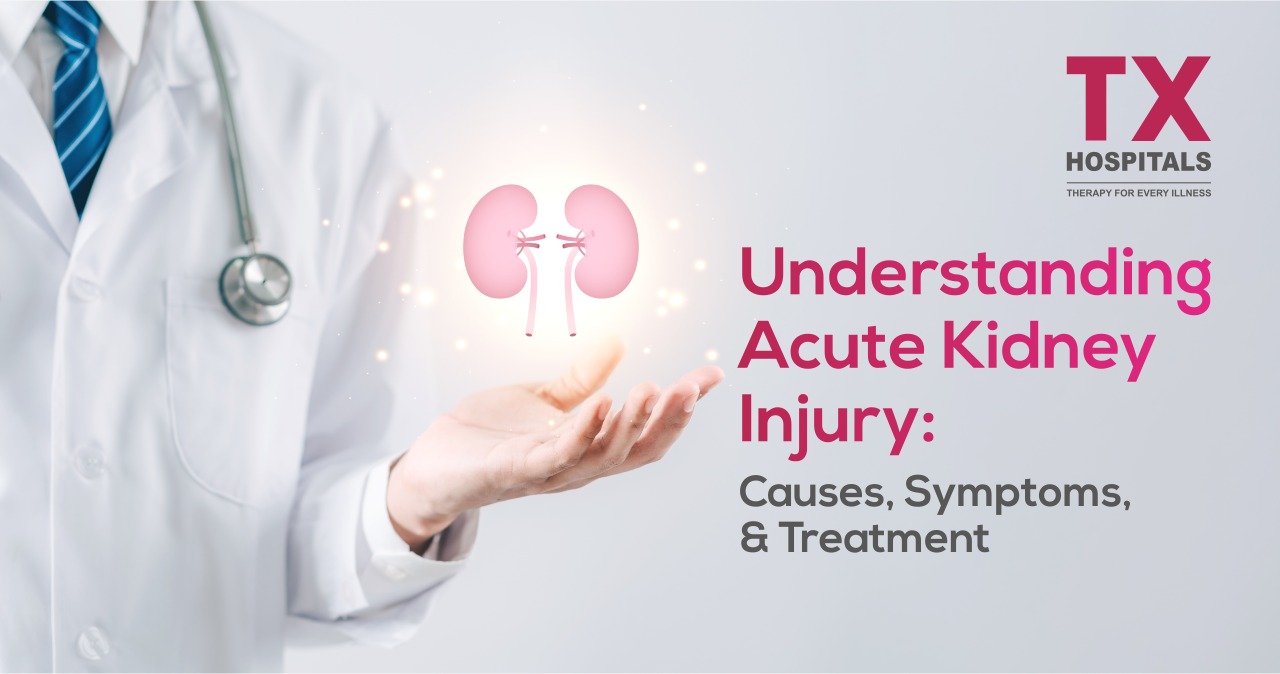Understanding Acute Kidney Injury: Causes, Symptoms, & Treatment
Introduction:
Acute Kidney Injury (AKI), previously known as acute renal failure, is a sudden onset of kidney dysfunction or damage occurring within a short span of time, usually within a few hours to days. This condition disrupts the kidney’s ability to filter waste products from the blood and maintain fluid balance in the body. It can also impact other vital organs like the brain, heart, and lungs.
Causes of AKI: AKI can be triggered by various factors including:
- Dehydration or low blood volume
- Severe infections (sepsis)
- Certain medications (e.g., NSAIDs, antibiotics)
- Kidney obstruction or injury
- Serious illnesses (e.g., heart failure)
Symptoms of AKI: Symptoms may include decreased urine output, fluid retention, shortness of breath, confusion, fatigue, nausea, and chest pain.
Treatment of AKI: Immediate treatment focuses on addressing the underlying cause, managing symptoms, and preventing complications. This may involve intravenous fluids, medications to support kidney function, and treating any contributing infections or conditions.
For comprehensive care of AKI and other kidney-related conditions, it’s crucial to seek assistance from the top kidney hospital in Hyderabad. These specialized institutions offer advanced diagnostics, expert nephrologists, and cutting-edge treatments tailored to manage and treat acute kidney injuries effectively.
Pre-Renal Causes:
Decreased Blood Flow: Conditions like severe dehydration, blood loss, and sepsis can reduce blood flow to the kidneys.
Heart Conditions: Heart failure or heart attacks can impair blood flow to the kidneys.
Liver Failure: Severe liver diseases can lead to hepatorenal syndrome, reducing blood flow to the kidneys.
Intrinsic Renal Causes:
Direct Kidney Damage: Infections, autoimmune diseases, and certain medications can directly damage the kidney tissues.
Glomerulonephritis: Inflammation of the glomeruli, the filtering units of the kidney.
Acute Tubular Necrosis (ATN): Caused by severe and prolonged hypotension, toxins, or ischemia.
Post-Renal Causes:
Obstruction: Kidney stones, tumors, or an enlarged prostate can block the urinary tract, leading to a backflow of urine into the kidneys.
Urinary Retention: Conditions that impede the outflow of urine from the bladder.
Symptoms of Acute Kidney Injury
The symptoms of AKI can vary depending on the underlying cause and severity. Common symptoms include:
Decreased Urine Output: One of the earliest signs.
Swelling: Due to fluid retention in the legs, ankles, and around the eyes.
Fatigue and Weakness: Caused by a build-up of waste products in the blood.
Shortness of Breath: Due to fluid build-up in the lungs.
Confusion: Resulting from an imbalance in electrolytes.
Nausea and Vomiting: Often due to the accumulation of waste products in the blood.
Chest Pain or Pressure: Due to fluid overload affecting the heart.
Treatment of Acute Kidney Injury
The treatment of AKI focuses on resolving the underlying cause and preventing complications. Treatment strategies may include:
Medications:
Diuretics: To reduce fluid retention.
Electrolyte Management: To correct imbalances such as high potassium levels.
Antibiotics: If infections are the cause.
Dialysis: In severe cases, dialysis might be necessary to remove waste products and excess fluids from the blood.
Fluid Management: Carefully monitored fluid intake and output to prevent dehydration or fluid overload.
Nutritional Support: Adjusting diet to manage electrolyte levels and provide adequate calories and protein.
Treatment of Underlying Conditions: Managing conditions such as heart failure, liver disease, or obstructions that contribute to AKI.
Kidney Transplant in Hyderabad at TX Hospitals
For patients with severe kidney damage, a kidney transplant may be the most effective treatment option. TX Hospitals in Hyderabad offers advanced kidney transplant services, providing comprehensive care from evaluation to post-transplant follow-up. The hospital is renowned for its experienced team of kidney transplant doctors, state-of-the-art facilities, and personalized patient care.
Dr. N. Pawan Kumar Rao at TX Hospitals is a leading kidney transplant specialist in Hyderabad. With extensive experience and a high success rate, Dr. Rao and the dedicated nephrology team ensure the best possible outcomes for patients undergoing kidney transplants.
Why Choose TX Hospitals?
Expert Team: Highly skilled nephrologists and transplant surgeons.
Advanced Technology: Cutting-edge equipment and facilities.
Comprehensive Care: From pre-transplant evaluation to post-transplant follow-up.
Patient-Centered Approach: Personalized care tailored to each patient’s needs.
If you or a loved one is experiencing symptoms of AKI or considering a kidney transplant, TX Hospitals in Hyderabad offers top-notch care and expertise. Don’t wait—take the first step towards recovery today.
Book Now at TX Hospitals, Hyderabad: Call 9089489089 for appointments and consultations with the best kidney transplant doctors.
This content covers the critical aspects of Acute Kidney Injury and highlights the exceptional kidney transplant services available at TX Hospitals, Hyderabad.








